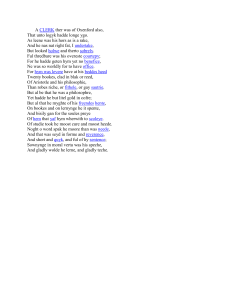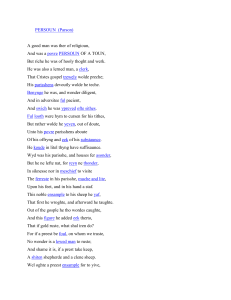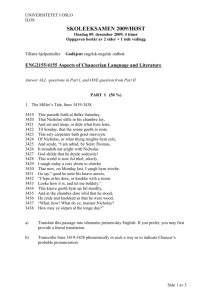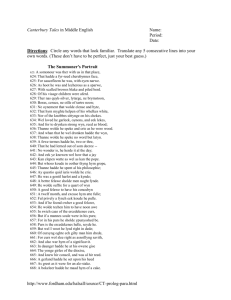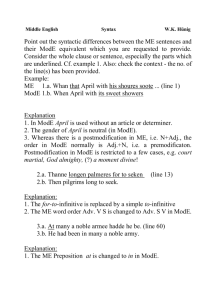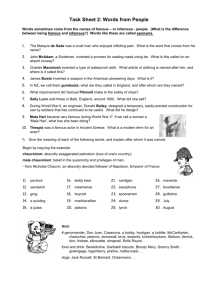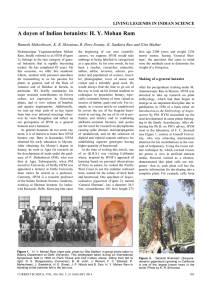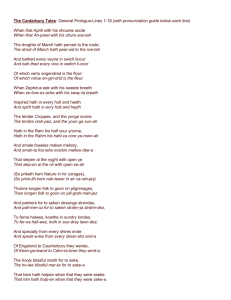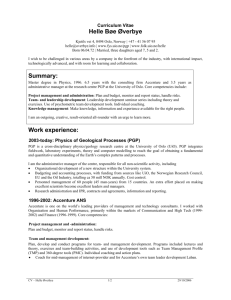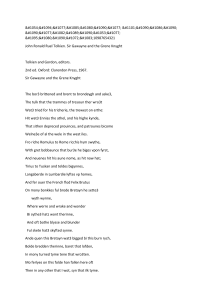File - The Fish in Prison
advertisement
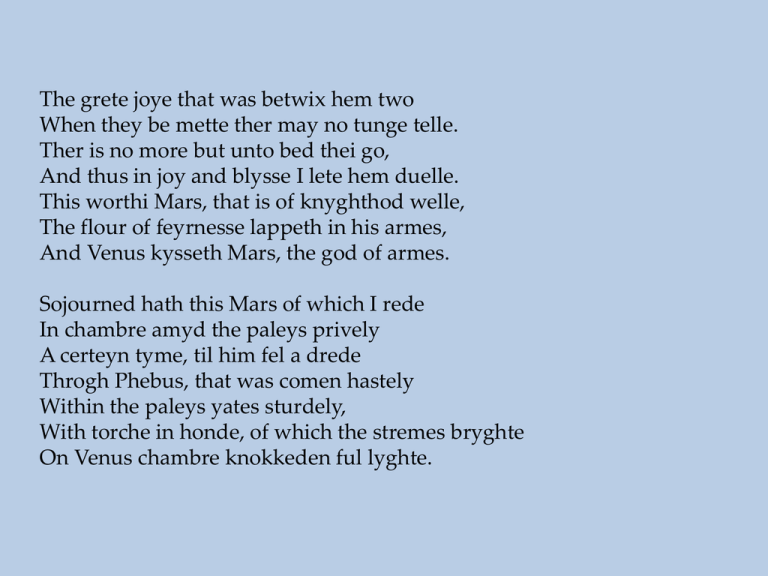
The grete joye that was betwix hem two When they be mette ther may no tunge telle. Ther is no more but unto bed thei go, And thus in joy and blysse I lete hem duelle. This worthi Mars, that is of knyghthod welle, The flour of feyrnesse lappeth in his armes, And Venus kysseth Mars, the god of armes. Sojourned hath this Mars of which I rede In chambre amyd the paleys prively A certeyn tyme, til him fel a drede Throgh Phebus, that was comen hastely Within the paleys yates sturdely, With torche in honde, of which the stremes bryghte On Venus chambre knokkeden ful lyghte. No tongue may tell of the great joy that was between the two of them when they met one another. There is no more (for us to say or them to do) but they went right to bed, and thus in joy and bliss I let them dwell. This worthy Mars, the wellspring/origin of knighthood/chivalry, embraces the flower of beauty in his arms, and Venus kisses Mars, the god of arms (weapons). This Mars of which I speak (or read) sojourned in a chamber/room within the palace secretly (privately), for a certain time, until a dread/fear fell upon him on account of Phebus, who had come hastily and boldly (sturdily) within the palace gates, with torch in hand, of which the bright beams/streams knocked on Venus' chamber with much brilliance (with much light). "...how bitter was the sorrow of the lovers when we were forced to part! With what shame was I overwhelmed, with what contrition smitten because of the blow which had fallen on her I loved, and what a tempest of misery burst over her by reason of my disgrace! Each grieved most, not for himself, but for the other. Each sought to allay, not his own sufferings, but those of the one he loved. The very sundering of our bodies served but to link our souls closer together; the plentitude of the love which was denied to us inflamed us more than ever. Once the first wildness of shame had passed, it left us more shameless than before, and as shame died within us the cause of it seemed to us ever more desirable. And so it chanced with us as, in the stories that the poets tell, it once happened with Mars and Venus when they were caught together. It was not long after this that Heloise found that she was pregnant, and of this she wrote to me in the utmost exultation, at the same time asking me to consider what had best be done. Accordingly, on a night when her uncle was absent, we carried out the plan we had determined on, and I stole her secretly away from her uncle's house, sending her without delay to my own country. She remained there with my sister until she gave birth to a son, whom she named Astrolabe." --Peter Abelard, Historia Calamitatum Nova Sophia Miller, age 1, expressing her admiration for Geoffrey Chaucer, her "homeboy" Oresme's Six Divisions of Astrology 1) measuring and tracking the movements of the heavens to allow us to make predictions (such as those below) 2) identifying the particular influence of stars on the physical effects in the world over which they have power (heat, cold) 3) connecting major astronomical events such as the conjunctions of planets to predicting great events in the world; predicting the weather; or understanding the bodily humors so that the correct medicine can be taken at the correct time 4) nativities: predicting human destiny based on astrological configurations at birth 5) interrogations: asking a question and finding an answer based on the position of the heavens (a kind of divination) 6) elections: similar to the above, but the question will concern the proper time to undertake a journey or some other action, etc. Alectromancy – "divination by cock," i.e. divination by the feeding behavior of roosters or other chickens "Publius Clodius Pulcher performed the inspection of the omens before [a battle in the First Punic War], according to Roman religious tradition. The prescribed method was observing the feeding behaviour of the sacred chickens, on board for that purpose. If the chickens accepted the offered grain, then the Roman gods would be favourable to the battle. However, on that particular morning of 249 BC, the chickens refused to eat – a horrific omen. Confronted with the unexpected and having to deal with the superstitious and now terrified crews, Pulcher quickly devised an alternative interpretation. He threw the sacred chickens overboard, saying, Let them drink, since they don't wish to eat. (Bibant, quoniam esse nolunt)." The science of Astronomie I thinke for to specefie, Withoute which, to telle plein, Alle othre science is in vein Toward the scole of erthli thinges. For as an egle with his winges Fleth above alle that men finde, So doth this science in his kinde. Lege planetarum magis inferiora reguntur, Ista set interdum regula fallit opus. Vir mediante deo sapiens dominabitur astris, Fata nec immerito quid nouitatis agunt. [Things lower down are ruled by the law of the planets, and sometimes that governance foils endeavor. With God's intervention the wise man will rule the stars, and the fates will not cause anything suddenly unfavorable.] And whan that he [Troilus] was slayn in this manere [that is, by Achilles], His lighte goost ful blisfully is went Up to the holughnesse of the eighthe spere, In convers (converse/opposite side) letyng ("letting" i.e. abandoning) everich element; And ther he saugh with ful avysement (deliberation, consideration) The erratik sterres, herkenyng armonye With sownes ful of hevenyssh melodie. And down from thennes faste he gan avyse (see, consider) This litel spot of erthe that with the se Embraced is, and fully gan despise This wrecched world, and held al vanite To respect of the pleyn felicite That is in hevene above; and at the laste, Ther he was slayn his lokyng down he caste, And in hymself he lough right at the wo Of hem that wepten for his deth so faste, And dampned al oure werk that foloweth so The blynde lust, the which that may nat laste, And sholden al oure herte on heven caste; And forth he wente, shortly for to telle, Ther as Mercurye sorted hym to dwelle. --Chaucer, Troilus and Criseyde Book V.1807-1827) "Blisful is that man that may seen the clere welle of good! Blisful is he that mai unbynden hym fro the boondes of the hevy erthe! The poete of Trace, Orpheus, that whilome hadde ryght greet sorwe for the deth of his wyf, aftir that he hadde makid by his weeply songes the wodes moevable to renne, and hadde makid the ryveris to stonden stille, and hadde maked the hertes and the hyndes to joynen dreedles here sydes to cruel lyouns for to herknen his song, and hadde maked that the hare was nat agast of the hound, whiche was plesed by his song; so, whanne the moste ardaunt love of his wif brende the entrayles of his breest, ne the songes that hadden overcomen alle thinges ne mighten nat asswagen hir lord Orpheus, he pleynid hym of the hevene goddis that weren cruel to hym. "He wente hym to the houses of helle, and ther he tempride his blaundysschinge songes by resounynge strenges, and spak and song in wepynge al that evere he hadde resceyved and lavyd out of the noble welles of his modir Callyope the goddesse. And he sang with as mochel as he myghte of wepynge, and with as moche as love that doublide his sorwe myghte yeve hym and teche hym, and he commoevde the helle, and requyred and bysoughte by swete preyere the lordes of soules in helle of relessynge, that is to seyn, to yelden hym his wyf. Cerberus, the porter of helle, with hise thre hevedes, was caught and al abasschid of the newe song. And the thre goddesses, furiis and vengeresses of felonyes, that tormenten and agasten the soules by anoy, woxen sorweful and sory, and wepyn teeris for pite. Tho was nat the heved of Yxion ytormented by the overthrowynge wheel. And Tantalus, that was destroied by the woodnesse of long thurst, despyseth the floodes to drynken. The foul that highte voltor, that etith the stomak or the gyser of Tycius, is so fulfild of his song that it nil eten ne tiren no more. At the laste the lord and juge of soules was moevid to misericordes, and cryede: "We ben overcomen," quod he; "yyve we to Orpheus his wif to beren hym compaignye; he hath wel ybought hire by his faire song and his ditee." "But we wolen putten a lawe in this and covenaunt in the yifte; that is to seyn that, til he be out of helle, yif he loke byhynde hym, that his wyf schal comen ageyn unto us." But what is he that may yeven a lawe to loverys? Love is a grettere lawe and a strengere to hymself thanne any lawe that men mai yyven. Allas! Whanne Orpheus and his wif weren almest at the termes of the nyght (that is to seyn, at the laste boundes of helle), Orpheus lokede abakward on Erudyce his wif, and lost hire, and was deed. "This fable apertenith to yow alle, whosoevere desireth or seketh to lede his thought into the sovereyn day, that is to seyn, to cleernesse of sovereyn good. For whoso that evere be so overcomen that he ficche his eien into the put of helle, that is to seyn, whoso sette his thoughtes in erthly thinges, al that evere he hath drawen of the noble good celestial he lesith it, whanne he looketh the helles, that is to seyn, into lowe thinges of the erthe.
